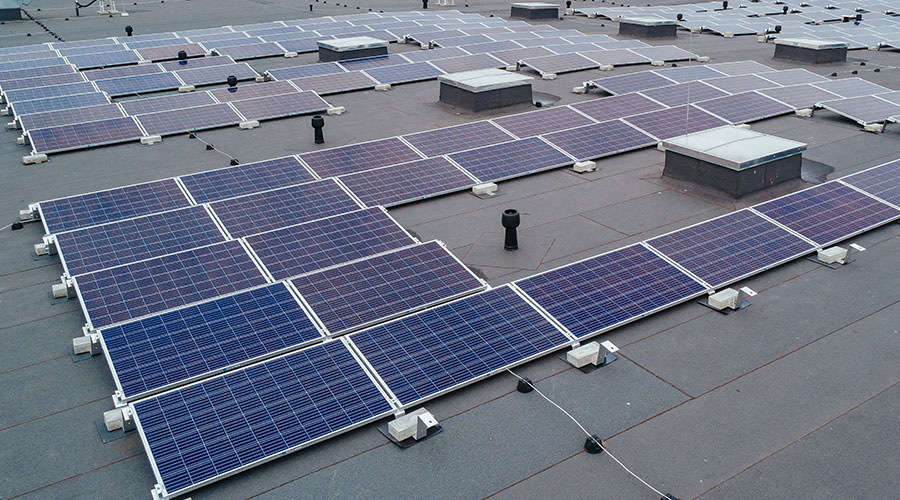DOE Details Release of $204 Million in Stimulus Funding For State Energy Efficiency Projects
More than $204 million in Recovery Act funding has been released to support energy efficiency and renewable energy projects in ten states, the Department of Energy (DOE) announced.
More than $204 million in Recovery Act funding has been released to support energy efficiency and renewable energy projects in ten states, the Department of Energy (DOE) announced.
Under DOE's State Energy Program (SEP), states have proposed statewide plans that prioritize energy savings, create or retain jobs, increase the use of renewable energy, and reduce greenhouse gas emissions. This initiative is part of the Obama Administration's national strategy to support job growth, while making a historic down payment on clean energy and conservation.
"This funding will provide an important boost for state economies, help to put Americans back to work and move us toward energy independence," says Energy Secretary Steven Chu. "It reflects our commitment to support innovative state and local strategies to promote energy efficiency and renewable energy while insisting that taxpayer dollars be spent responsibly."
The following states are receiving 40 percent of their total SEP funding authorized under the American Recovery and Reinvestment Act, DOE says: Arizona, Connecticut, Florida, Idaho, Kansas, Minnesota, South Carolina, South Dakota, Utah, and Washington.
With today's announcement, these states will now have received 50 percent of their total Recovery Act SEP funding. The initial 10% of total funding was previously available to states to support planning activities; the remaining 50% of funds will be released once states meet reporting, oversight, and accountability milestones required by the Recovery Act.
Under the Recovery Act, DOE expanded the types of activities eligible for State Energy Program funding, which include energy audits, building retrofits, education and training efforts, transportation programs to increase the use of alternative fuels and hybrid vehicles, and new financing mechanisms to promote energy efficiency and renewable energy investments.
The Recovery Act appropriated $3.1 billion to the State Energy Program to help achieve national energy independence goals and promote local economic recovery. States use these grants at the state and local level to create green jobs, address state energy priorities, and adopt emerging renewable energy and energy efficiency technologies.
Transparency and accountability are important priorities for SEP and all Recovery Act projects. Throughout the program's implementation, DOE will provide strong oversight at the local, state, and national level, while emphasizing with states the need to quickly award funds to help create new jobs and stimulate local economies.
The following states are receiving awards today, according to DOE's announcement:
ARIZONA - $22.2 million
Arizona plans to use its State Energy Program funding for a series of programs aimed at advancing energy efficiency and renewable energy investments statewide, while supporting renewable energy manufacturers and products made in the state. Arizona will establish a revolving loan program in order to provide a sustainable financing mechanism for small business owners who are looking to fund energy efficient building improvements or install solar projects at their facilities. The state will offer revolving loan funds for energy efficiency and renewable energy projects in commercial buildings, along with loans to manufacturers of renewable energy or energy efficiency equipment and technologies.
After demonstrating successful implementation of its plan, the state will receive an additional $27 million, for a total of $55 million.
CONNECTICUT - $15.4 million
Connecticut plans to use its SEP funding to create or protect jobs and save energy with several projects, including in-home energy audits and the deployment of a variety of technologies, such as alternative-fuel vehicles. In one project, Recovery Act funds will enable more residents to take advantage of inexpensive in-home energy audits designed to reduce energy bills and encourage energy efficiency. For each home, a specialist will perform an energy assessment, find and professionally seal critical leaks and drafts, replace incandescent bulbs with compact fluorescent lamps, provide and install water conservation devices, and check insulation and appliances.
The state will also use funding to support four Clean Cities coalitions—Greater New Haven, Clean Cities of Southwestern Connecticut, Norwich Clean Cities and Capital Clean Cities—to support their efforts to facilitate the adoption of alternate fuels and petroleum-reducing technologies in Connecticut.
After demonstrating successful implementation of its plan, the state will receive an additional $19 million, for a total of $38 million.
FLORIDA - $50.4 million awarded
With its Recovery Act SEP funding, Florida plans to advance its energy efficiency efforts and encourage the production, availability and use of renewable energy and alternative fuels. Under the program Florida will create several loan and grant programs to promote investment and commercialization of various energy efficiency and renewable energy technologies.
After demonstrating successful implementation of its plan, the state will receive an additional $63 million, for a total of $126 million.
IDAHO - $11.4 million awarded
Idaho plans to utilize Recovery Act SEP funding to launch a set of programs, including a Renewable Energy Business Development Program, that will help increase the use of renewable energy while creating new jobs and stimulating the state's economy. Two initiatives encourage state schools to reduce energy costs by adopting renewable energy and energy efficiency projects. Other initiatives seek to stimulate the state's economy by creating new zoning regulations in order to attract renewable energy developers to build new projects.
After demonstrating successful implementation of its plan, the state will receive more than $14 million in additional funding, for a total of more than $28 million.
KANSAS - $15.3 million awarded
Kansas plans to distribute its SEP funding to several initiatives that will benefit overall efficiency for commercial buildings, increase financial options for investing in renewable energy, and increase costs savings for individual home owners across the state. The funding will also be applied to developing a robust work force of energy auditors. A portion of the funding will go toward developing a new utility rate pricing plan as well as an energy audit rebate plan for home and small-business owners. To improve the quality and breadth of the energy auditor industry in the state, Kansas will subsidize costly technical audit equipment and also provide scholarships for additional professional training.
After demonstrating successful implementation of its plan, the state will receive more than $19 million in additional funding, for a total of more than $38 million.
MINNESOTA - $21.7 million awarded
Minnesota plans to put its Recovery Act funds to use improving energy efficiency in residential, commercial, and government buildings, as well as increasing the amount of renewable energy produced in-state. Minnesota will award grants to small, medium, and large businesses to help provide for the design, financing, and installation of various energy efficiency improvements and retrofits. The state will also administer grants to work with utilities to develop programs that leverage Recovery Act funds to promote energy efficiency with customers, such as low-interest loans and grants.
Minnesota is also prioritizing community outreach and trainings for energy professionals to ensure broad participation in its SEP programs. For example, the State Energy Information Center will organize Clean Energy Resource Teams comprised of local organizations and citizens to perform outreach and communications about the programs.
After demonstrating successful implementation of its plan, the state will receive more than $27 million in additional funding, for a total of more than $54 million.
SOUTH CAROLINA - $20.2 million awarded
South Carolina plans to use its Recovery Act SEP funding to provide grants and loans to improve energy efficiency in public school districts, public colleges and universities, and state agencies to reduce the burden of energy bills for taxpayers, while creating jobs and reducing greenhouse gas emissions. South Carolina also intends to provide financial assistance to various industrial, commercial and small business entities to support energy efficiency and renewable energy projects. This financial assistance, along with education and training programs included in the SEP, will help create clean energy jobs in the state and make business and industry more economically stable.
After demonstrating successful implementation of its plan, the state will receive more than $25 million in additional funding, for a total of over $50 million.
SOUTH DAKOTA - $9.5 million awarded
South Dakota plans to use its SEP funding to support the Energy Efficient Government program and to provide revolving energy loans to state institutions. The programs will promote energy efficiency efforts while reducing energy costs in state owned buildings, which will directly benefit state residents. The state's energy office will administer the funds, provide technical guidance, and assure accountability and transparency for the state institutions who apply for the two programs. These programs coordinate with South Dakota's energy goals to promote and encourage energy conservation, energy efficiency, renewable energy and alternative fuels.
After demonstrating successful implementation of its plan, the state will receive more than $11 million in additional funding, for a total of more than $23 million.
UTAH - $14.1 million awarded
Utah plans to utilize Recovery Act funds to improve energy efficiency in residential, commercial, public education, and government buildings. The state will provide financial incentives to low-income housing developments and commercial and government buildings that perform energy efficiency upgrades. For instance, low income housing units will qualify for free insulation upgrades and builders working on new construction developments will qualify for rebates if they build high performance buildings.
Utah will also use funding to collect more accurate data about the potential renewable energy resources in the state that can then be used to identify potential Renewable Energy Zones.
After demonstrating successful implementation of its plan, the state will receive more than $17 million in additional funding, for a total of more than $35 million.
WASHINGTON STATE - $24.3 million awarded
Washington plans to use Recovery Act funding to implement two major programs: the Community-Wide Urban Residential and Commercial Energy Efficiency Program and the Energy Efficiency and Renewable Energy Loans and Grants Program Fund. These two programs, along with several more to develop clean energy policy and promote energy assessments in the agricultural sector, will result in significant job creation and energy savings across the state. The Community-Wide Urban Residential and Commercial Energy Efficiency Program will enhance financial and technical assistance programs by directing municipal, state, and federal funds, as well as electric and gas utility funding, toward greater energy efficiency improvements and home weatherization efforts.
After demonstrating successful implementation of its plan, the state will receive more than $30 million in additional funding, for a total of over $60 million.
Related Topics:











